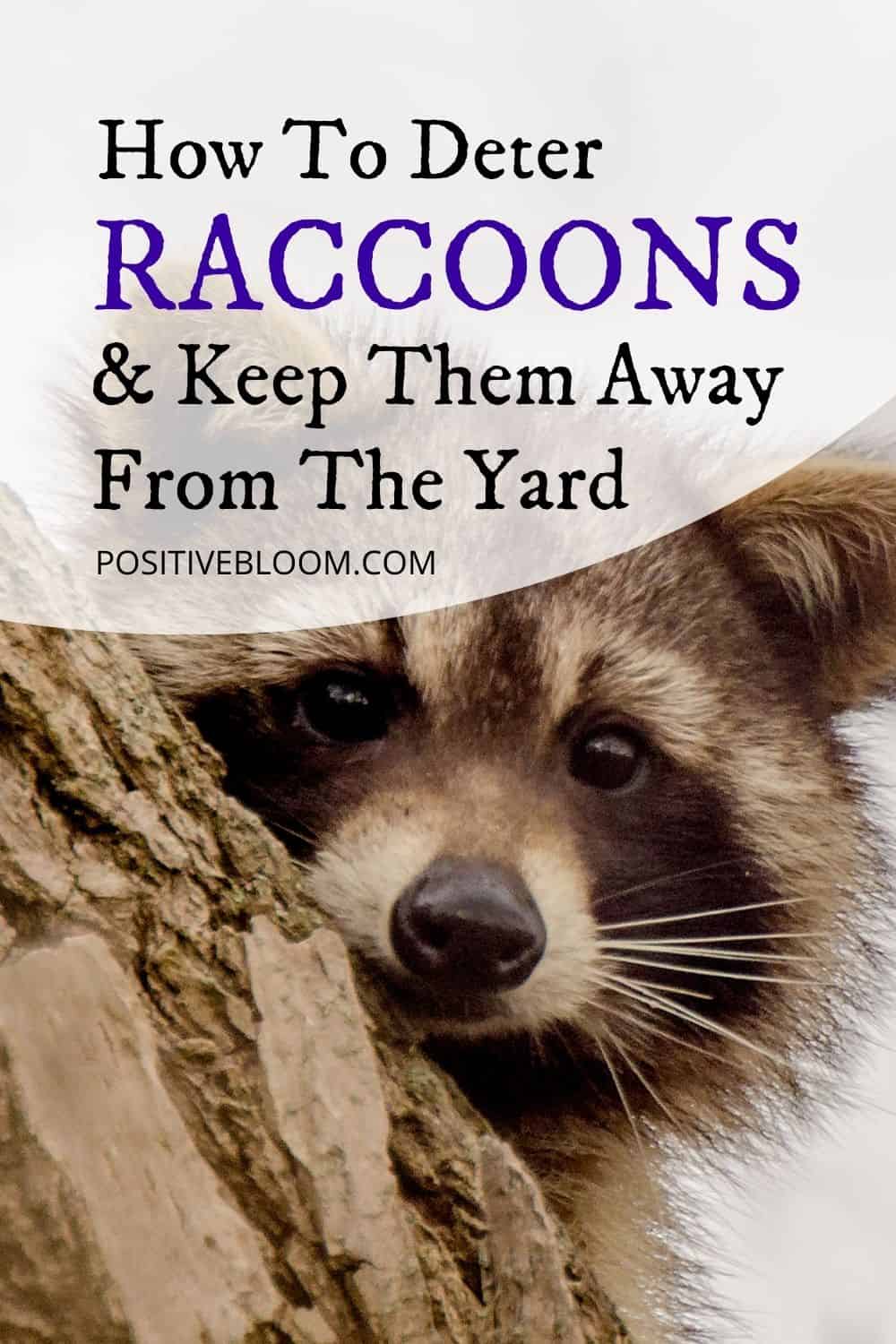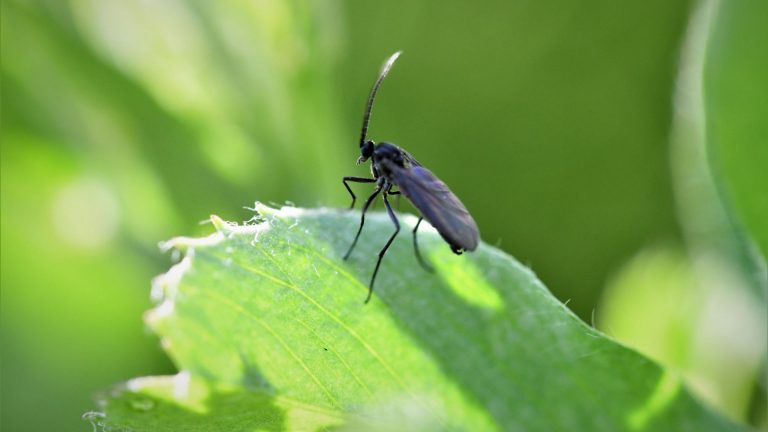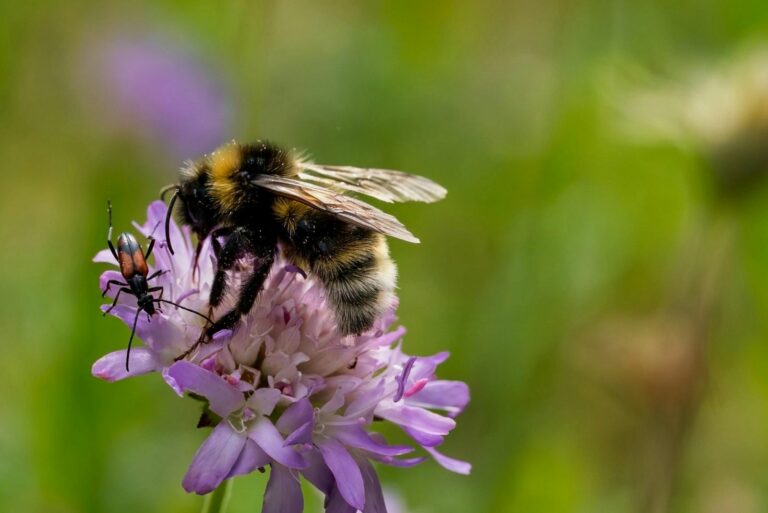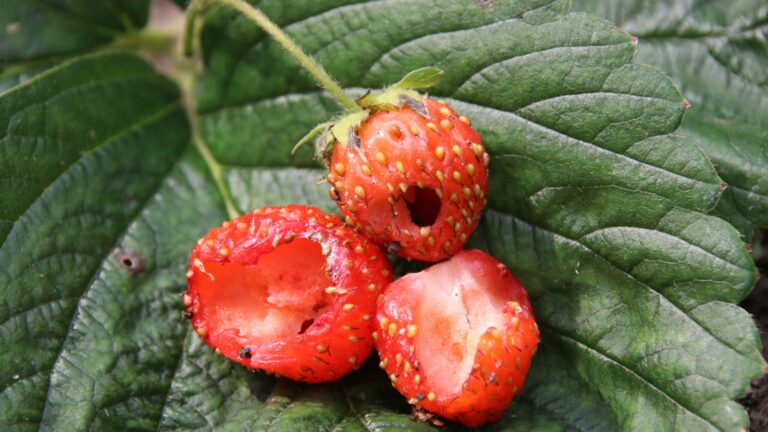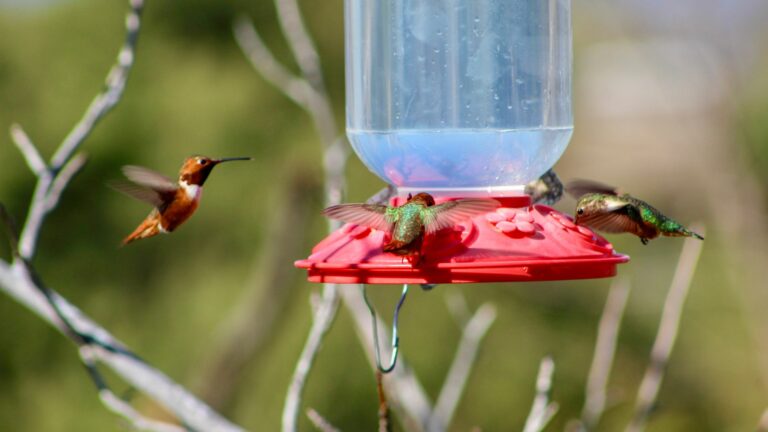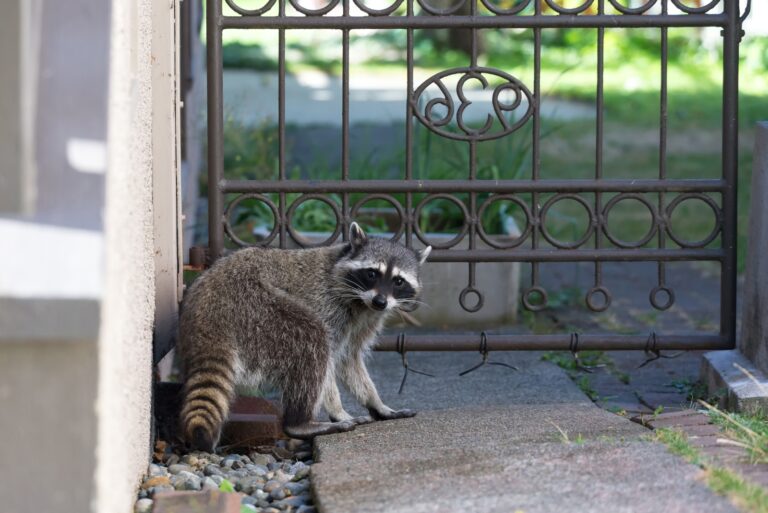How To Deter Raccoons And Keep Them Away From The Yard
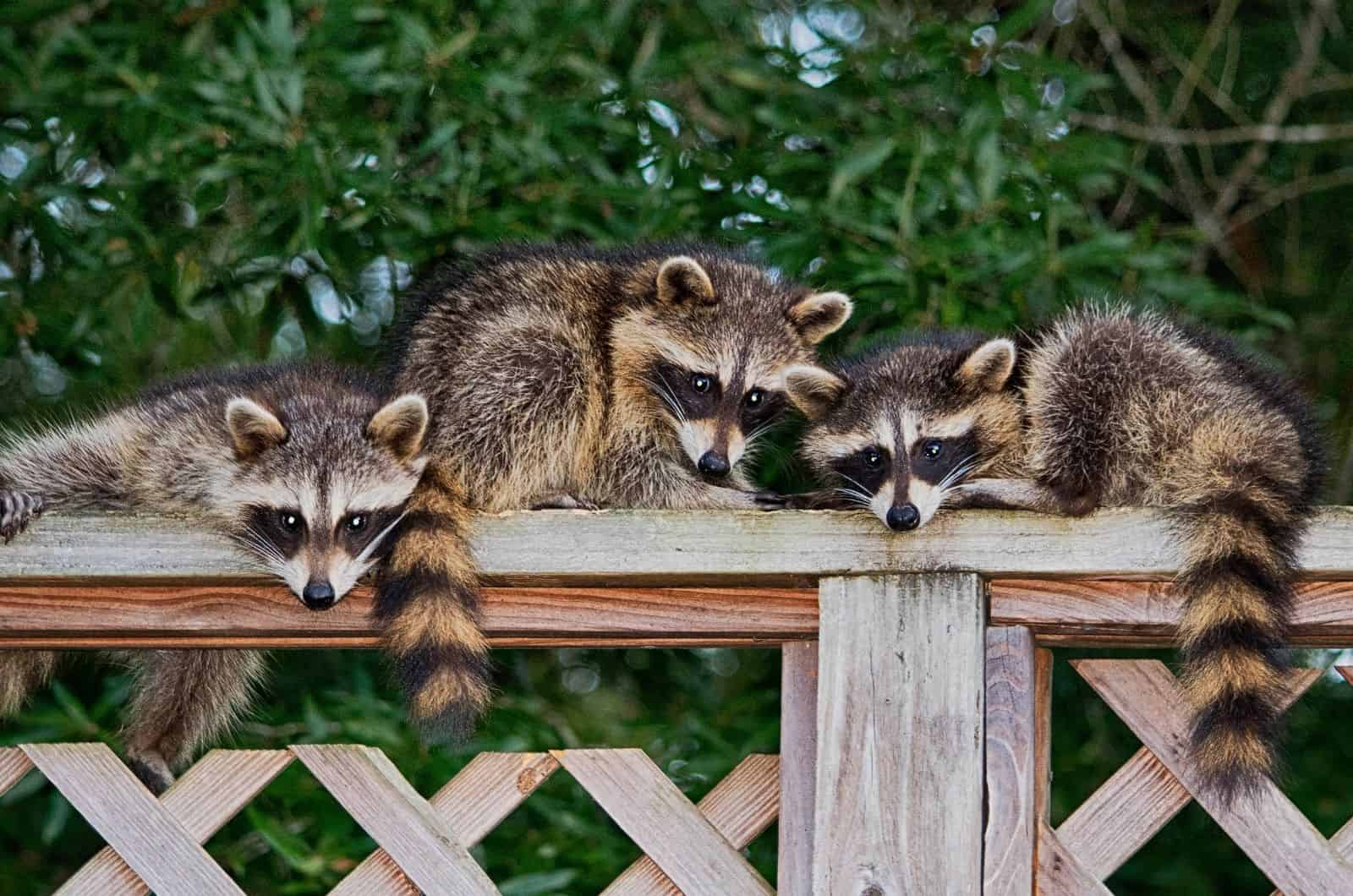
You can’t deny the fact that raccoons look pretty dainty. But as soon as they enter your yard, you’ll end up with trash and droppings all over your property!
Another issue is that these mischievous creatures can transmit diseases, so we should do anything we can to get rid of them. Although different chemicals can poison these animals, I recommend more humane methods.
I’ll show you how to deter raccoons without using any toxic substances. These guys are only looking for food, water, and some safety, so killing them is the last thing we should do.
Let’s get started!
How To Deter Raccoons
Why do raccoons come into our yards in the first place? Well, they need something to eat and drink, and they also need shelter – especially if their family is expanding.
Knowing this helps us determine our next steps. To get rid of raccoons, we should keep our trash cans tightly sealed, eliminate food and water sources, protect our fruits and veggies, use scent repellents, and install automatic lights and sprinklers.
Let’s get into details!
Keep Your Trash Cans Tightly Sealed
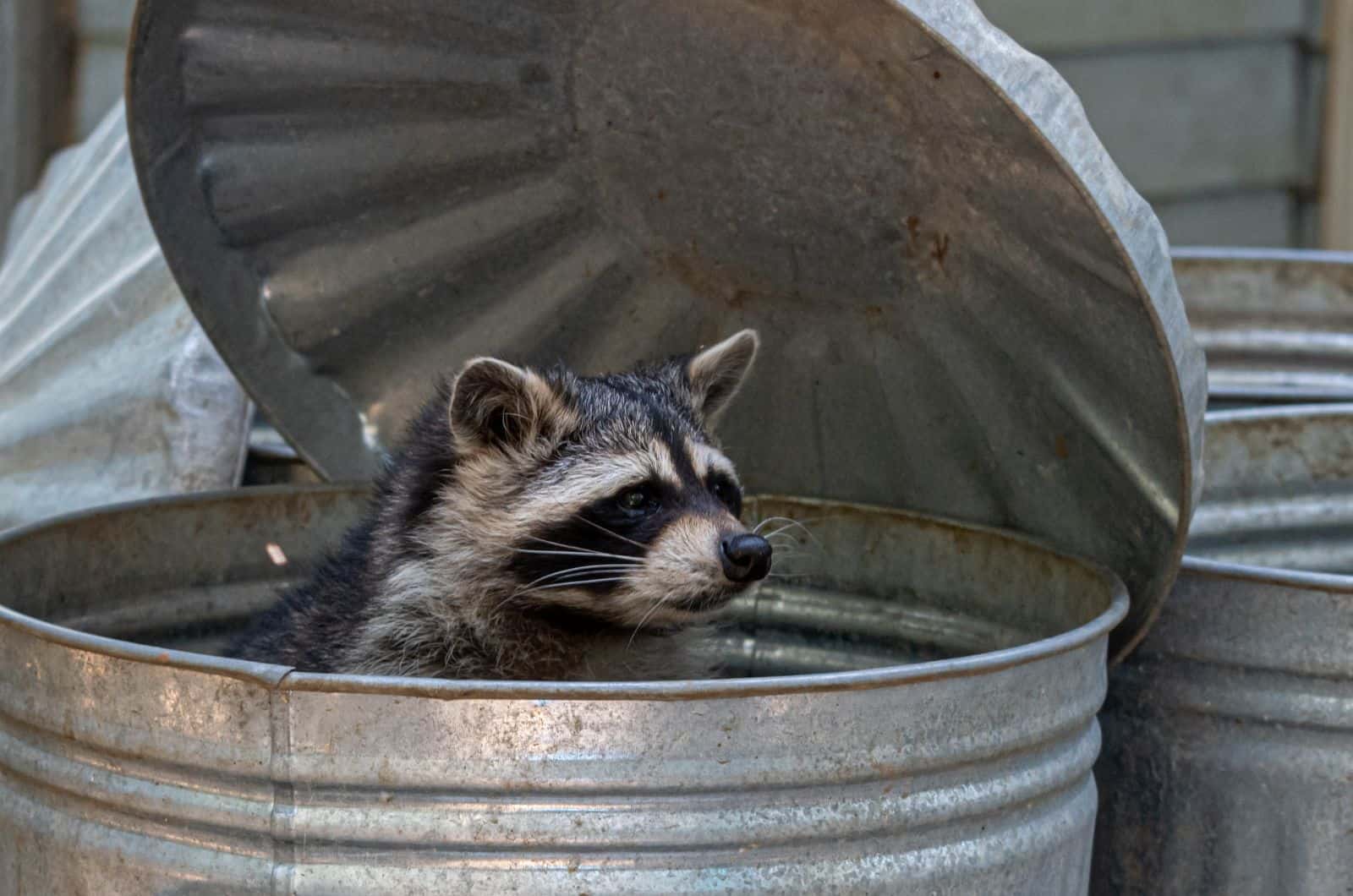
We frequently see raccoons hanging around trash cans, and if you see these animals in your yard, the first thing you should check is the trash cans.
These animals are more intelligent than you may realize, and they will tip your trash can over or open the top to get to the tempting treats inside.
Your goal is to seal the lid of your garbage can as tightly as possible. You can use elastic cords to secure the lid or place something heavy, such as cinder blocks, over the lid.
If you have a garage, keeping your trash can in it is the best thing you can do. Remember, if raccoons can’t reach it, they can’t destroy it!
But don’t be surprised if you find some raccoons near your garage trying to break in; the pungent smell of garbage may still draw them. When disposing of waste that has a strong odor, place it in a trash bag and seal it before you put it in the trash can.
Eliminate Food Sources
Trash cans aren’t the only food source for raccoons; they also find compost bins, pet food, grubs, and birdseed very attractive.
If you want to keep these nasty animals away from your property, find all potential food sources and eliminate them.
Compost Bin And Pile
If you are making compost in a bin, make sure you use the lid and tightly seal the bin. Again, if you have a garage you can put the bin there so that raccoons can’t reach it.
If you prefer compost piles, think about enclosing the pile with an electric fence. Just remember that these animals really love to climb, so conventional fencing won’t suffice.
Bird Feeders
These are nocturnal animals, so if you have bird feeders you can move them indoors so raccoons won’t be able to access them.
Raccoons are good climbers, but if you put a bird feeder on a thin pole, they can’t reach it. Additionally, put a raccoon guard at the base of the pole.
Pet Food
I know that the best way to feed your pets (outdoors) is to leave them a bowl with food and fill it when necessary.
However, this is a great opportunity for raccoons; not only will they steal from your pets, but they will also destroy everything else.
The best idea would be to bring bowls indoors overnight, or if you have a garage, keep the bowl there. This is also an excellent way to deter squirrels.
Fruit Trees
If raccoons visit your area searching for food and notice some fruits or nuts on the ground, they’ll definitely stop for a feast.
Of course, you won’t cut down your trees, but you can pick up any nuts or fruits on the ground before night approaches.
Remove Water Sources
When getting rid of food sources in your yard, don’t forget that raccoons also need water to survive.
Any water feature in your yard is a great reason for a raccoon to pay a visit. If you have a pond, a swimming pool, or a bird bath, for example, raccoons will use them to drink water.
Also, if you are collecting rainwater or have some buckets in your yard, you need to either remove them or seal them tightly.
Covering all water sources is the only way to deter raccoons from water features. Placing a sturdy material to cover swimming pools or ponds is the best thing you can do.
Raccoons adore fish ponds as they can feed and drink water in one place.
Cover Fruit And Vegetables
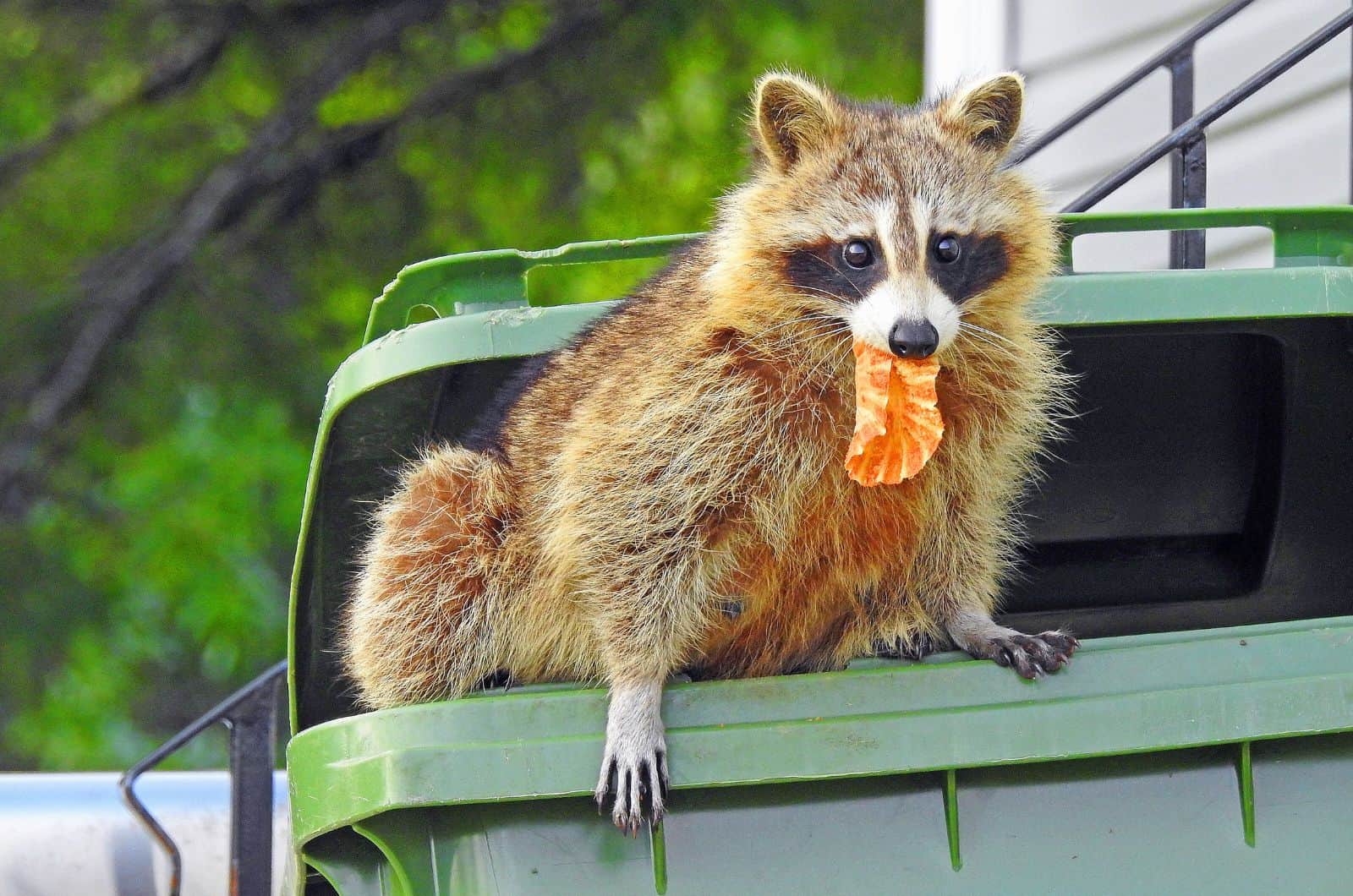
For those of you who have vegetable gardens, I know how hard it can be to protect your fruits and vegetables from these animals.
It would help if you covered your fruits and veggies. Installing an electric fence around your vegetable garden is the most efficient technique to keep raccoons away from your prized crops.
Don’t worry; an electric fence won’t kill raccoons or cause them serious damage, but will keep them away.
Install two strips of electric fencing around your vegetable garden, one at a height of approximately 6 inches and the other at a height of about 12 inches. This will prevent raccoons from jumping over it.
This is undeniably the best option unless you have small children. In that case, you can plant species with prickly leaves/vines as an alternative to an electric fence.
Use Scent Repellents
These small animals can detect your waste from great distances thanks to their keen sense of smell. But you can benefit from their perceptive noses. There are numerous strong odors that can confuse their senses and deter raccoons.
Purchase Raccoon Repellents
You can purchase a variety of items made to deter raccoons either online or at your neighborhood garden center. They typically arrive as liquid sprays.
Predator Urine
You can also use predator urine as a raccoon deterrent. Raccoons will consider your property dangerous if they smell urine from coyotes, wolves, or other wild animals.
Surprisingly, predator urine is available in most garden centers or online. They are labeled as pest control.
It would be best if you could find the urine of a predator prevalent in your area. Raccoons will definitely be repelled if they sense the smell of a well-known predator.
Make A Vinegar Solution (DIY)
Using vinegar is another excellent way to deter raccoons. If you hate the strong smell of vinegar, you can always dilute it.
Put diluted or undiluted vinegar in a spray bottle and spray the solution wherever you think the raccoons might come around.
Ammonia
You can find this chemical substance in all stores that typically sell products for pest control, or order it online. Soak a piece of old cloth in ammonia and put it in your yard or leave it open in the original container.
Contrary to popular belief, ammonia isn’t toxic to raccoons. They won’t even approach the substance. It’s an effective method for eliminating these animals without harming them.
Garlic
Raccoons hate the smell of garlic! There are two ways to use garlic as a raccoon deterrent.
First, you can use the cloves by crushing them and distributing them over your yard. Alternatively, use the juice of this vegetable by mixing it with water to make a spray.
Cayenne Pepper Solution
Dried cayenne pepper will also help you with raccoon control. Sprinkle it in places where these animals might congregate. Alternatively, dilute a can of dried cayenne pepper (or any other hot pepper) in a gallon of water to make a spray version.
Blood Meal
You can buy a powdered form of dried animal blood online or at a garden center. All you need to do is sprinkle the blood meal over your yard.
Plant Cucumbers
Consider planting cucumbers in your garden. They have the extra benefit that you can eat them, and raccoons detest their fragrance.
If you have a vegetable garden, I recommend planting cucumbers all around it to prevent these animals from feeding on your other veggies.
Spring Soap
You can use spring soap as a raccoon deterrent. You can either grate it or break it into pieces.
Scatter the pieces all over your yard; raccoons won’t like what they see!
Essential Oil
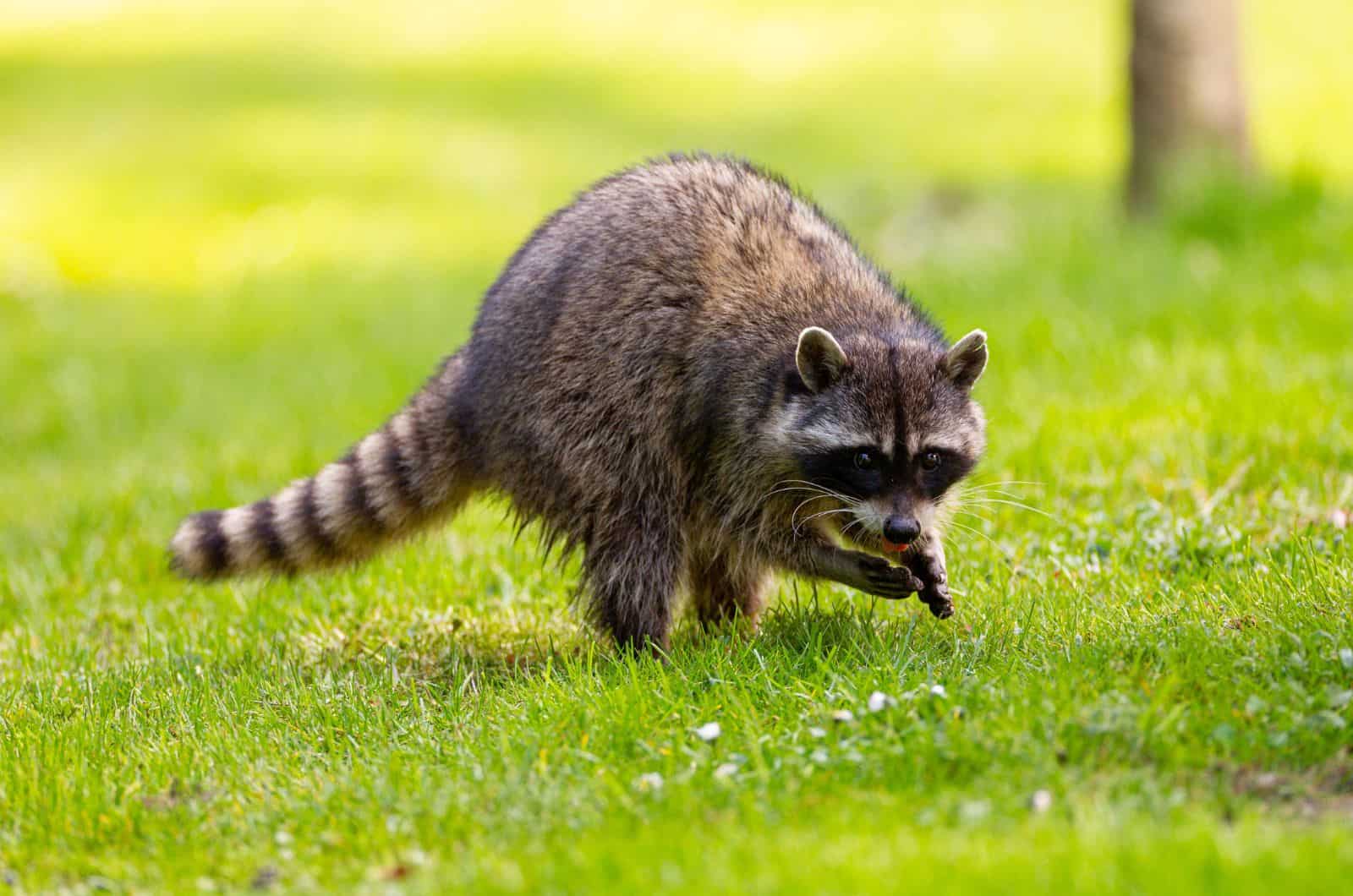
You can use some essential oil, such as peppermint oil, to deter raccoons. Add a couple of drops of peppermint oil to water and spray it over your property.
Pure peppermint oil is pretty pricey, but there’s no need to use it because the treated kind will also work well.
Epsom Salt
Epsom salt is another excellent raccoon repellent. Simply scatter it around your yard and watch the magic happen.
I have to mention that you don’t need to cover your entire yard in these awful aromas. Just use them where you might expect to encounter raccoons, such as close to food sources, water sources, or enclosed areas.
You can use any of these deterrents to make a border around your yard.
Note On Scent Repellents
Remember that these solutions won’t last for long. It would be best if you reapplied them every couple of days for long-lasting benefits.
Although these repellents won’t last long, they will keep raccoons away long enough for you to secure your trash cans, remove food and water sources, and cover your fruits and veggies.
Pet owners should be aware that these scents aggravate cats, dogs, and other pets just as much as they aggravate raccoons. With these odors present, your pets might not want to leave the house.
Use Automatic Lights And Sprinklers
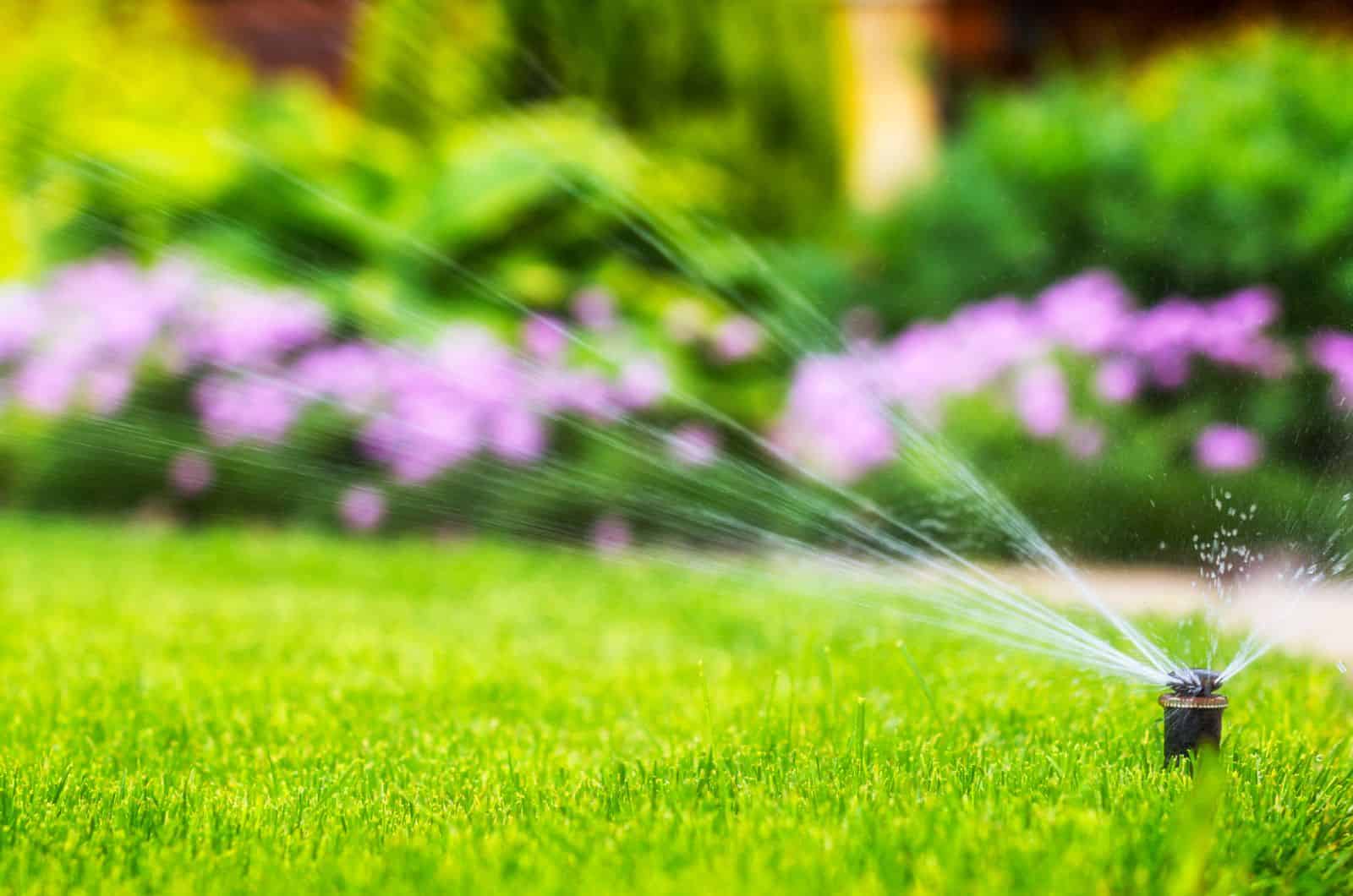
Another excellent way to repel raccoons is by using a motion-activated sprinkler. A sudden burst of water acts as a great deterrent.
How would you feel if you were sneaking around somewhere you shouldn’t, and then all of a sudden you were drenched with water?
If you use a motion-activated sprinkler, it will spray water only when it senses movement.
The great thing about this method is that it will keep other critters at bay. If you plan to use this device to scare raccoons away, make sure you set them to activate at night.
You can also install automatic lights. When placed strategically across the yard, motion sensor lights can swiftly scare off animals before they have a chance to approach the property.
This will also repel birds, such as magpies.
Use Sonic Pest Repellents
These devices produce a high-pitched sound that humans cannot hear, but which frightens animals.
They are intended to deter other wild animals, not just raccoons. The sound won’t damage them in the long run, but it can momentarily disorientate them.
Owners of pets should be aware that sonic repellents can make these animals feel dizzy when they go outside. As long as your pets are inside your house, the sound shouldn’t bother them because it doesn’t penetrate walls.
Never Feed Them
I’ve seen people feeding these animals multiple times. I know that you may sometimes feel pity and decide to feed these cute creatures, but please don’t do it.
If you leave them food, they’ll keep coming every night hoping for a free meal.
But things will get worse once they bring their friends or decide to start a family on your property. They won’t pay the rent, plus they’ll also destroy anything that gets in their way!
Aside from the damage they will do to your property, these animals can be pretty aggressive, and what once was a cute animal will turn into a nightmare.
Additionally, these animals can transmit diseases, so you shouldn’t risk yours or your pet’s lives.
How To Keep Raccoons Out Of Your House
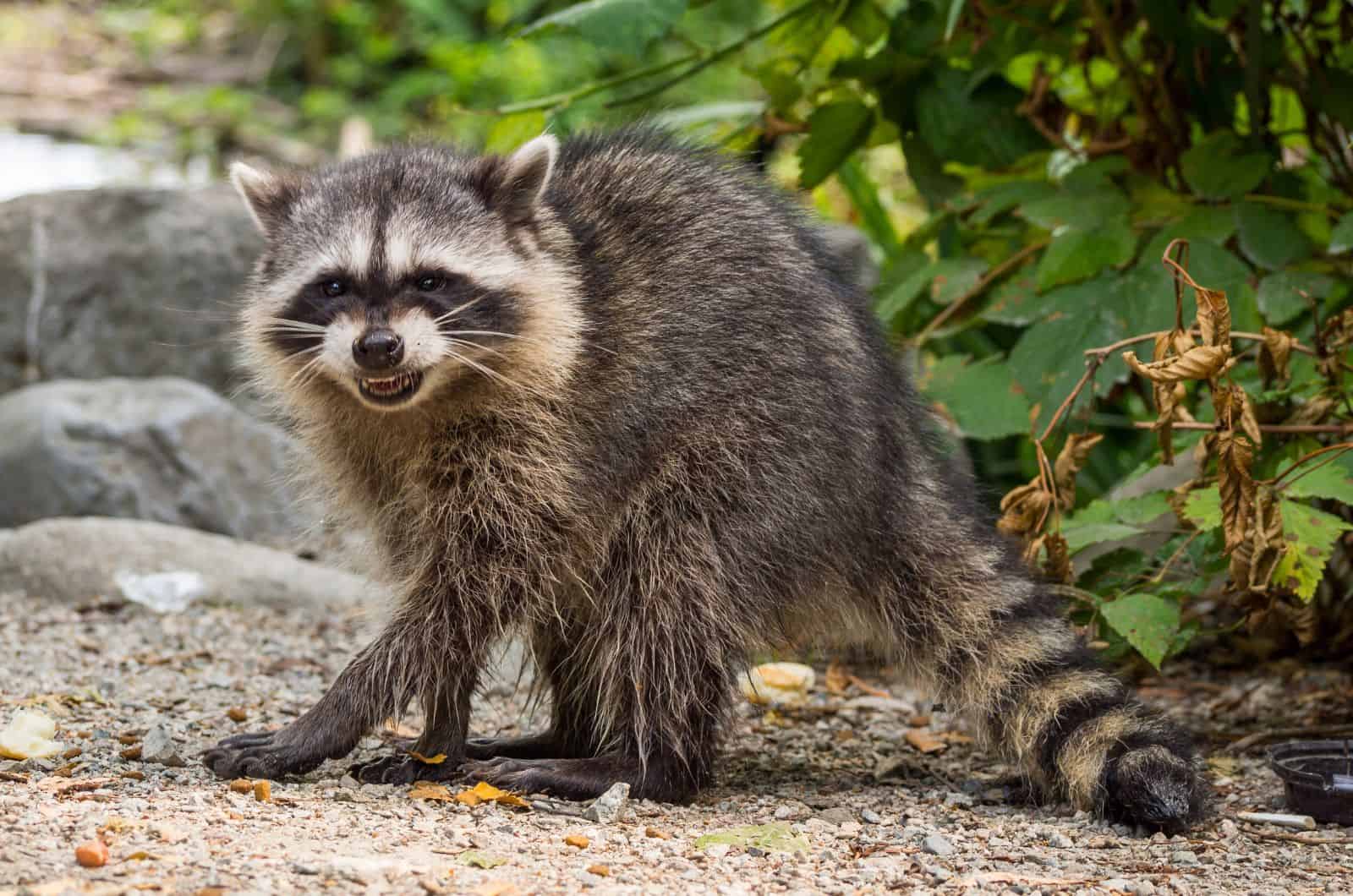
Once raccoons enter your property, it’s only a matter of time until they get inside your house.
The methods listed above will work, but if you haven’t done anything like that before, I recommend contacting professionals.
Let’s see how to deter raccoons from trying to get into your house.
How To Get Rid Of Raccoons In Your Attic
If you suspect you have raccoons in your attic, you should start searching for their babies. Check if the raccoon is a mother with young before taking any action to remove them.
If so, I don’t recommend getting rid of raccoons straight away. Wait a couple of weeks until the babies grow a little bit, and remember that they need their mother to survive.
Now you can start with deterring methods. You can put in one-way doors so that the animals can’t come back once they exit.
You can also use deterrents with loud noises. Apply scent repellents close to where raccoons are nesting to entice them to leave.
Live traps will also help you get rid of raccoons.
Your attic should be completely sealed, including vents and seals. You must determine how the animals got into the attic in the first place. Find the entryway by meticulously inspecting the house. These access points should be sealed using a wire mesh.
Double-check if any of the animals are still there because you don’t want to seal in the raccoon.
If there are any food or water sources present, eliminate them immediately.
How To Get Rid Of Racoons On The Roof
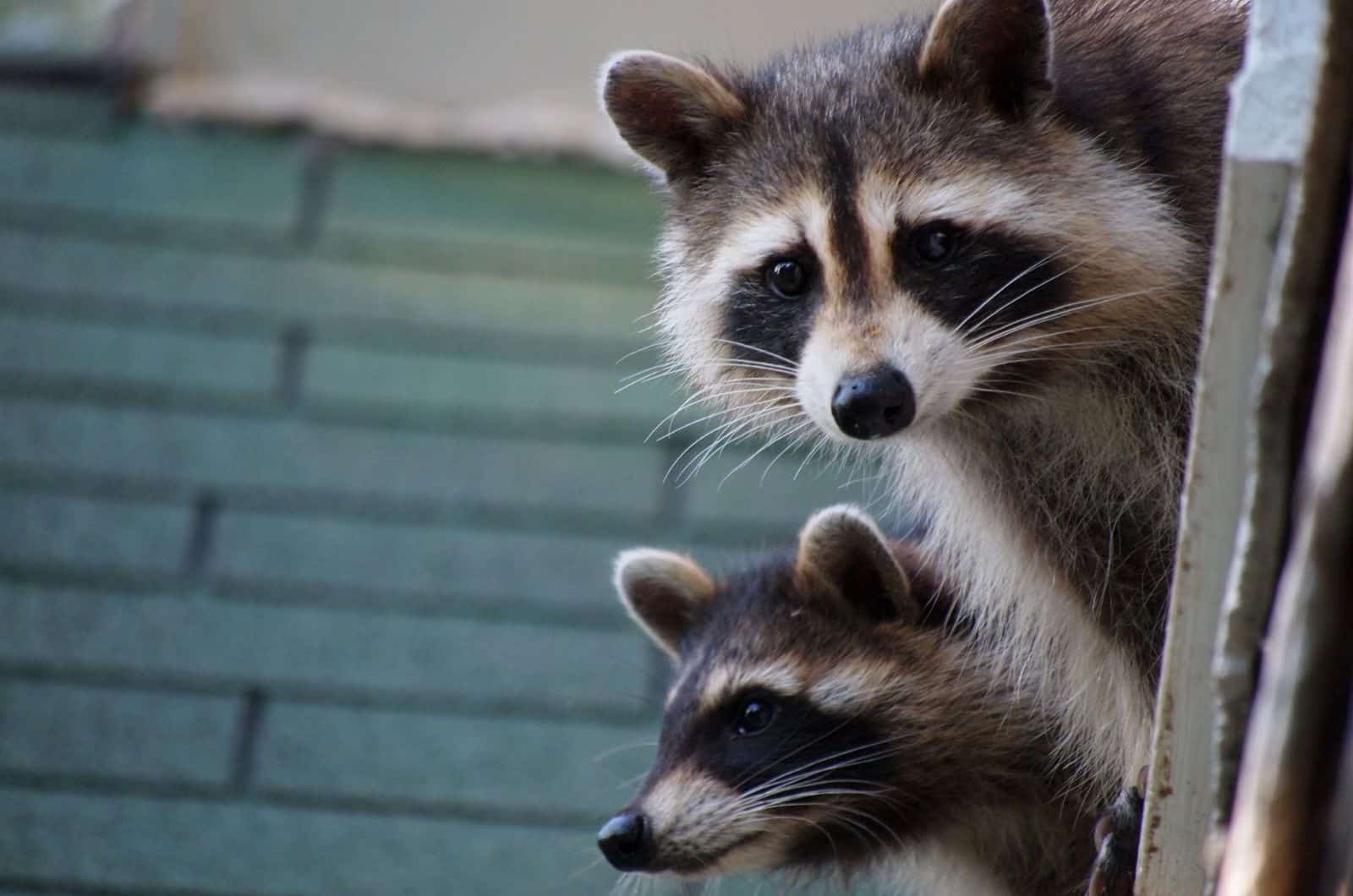
I mentioned that these creatures are skilled climbers. Although it might be unsettling to discover them on your roof, many people have had similar experiences.
You should be very careful with roofs because these animals can enter chimneys or vents, posing a fire risk. The more time they spend there, the more damage they may cause.
Reduce any so-called “bridges” onto your roof by trimming the trees, vines, and vegetation surrounding your house.
You can also cover the roof’s border on your house with metal sheeting. If any fences are too near to your roof, you can put a strip of electric fence on top.
I highly recommend contacting professionals if you are operating with your chimneys.
How To Deter Racoons From A Chicken Coop
Raccoons are ferocious chicken predators that will use whatever means necessary to get into a weak chicken coop.
First, you should put hardware cloth on the windows of your chicken coop. It is strong enough to withstand attacks.
You can also bury the cloth around the chicken coop; 2-4 feet deep should suffice.
If your chicken coop has chimneys, consider sealing these entry points with hardware cloth too.
Raccoons are very smart and will try to open coops, so installing latches on the doors will keep them at bay.
How To Tell If You Have A Raccoon Problem
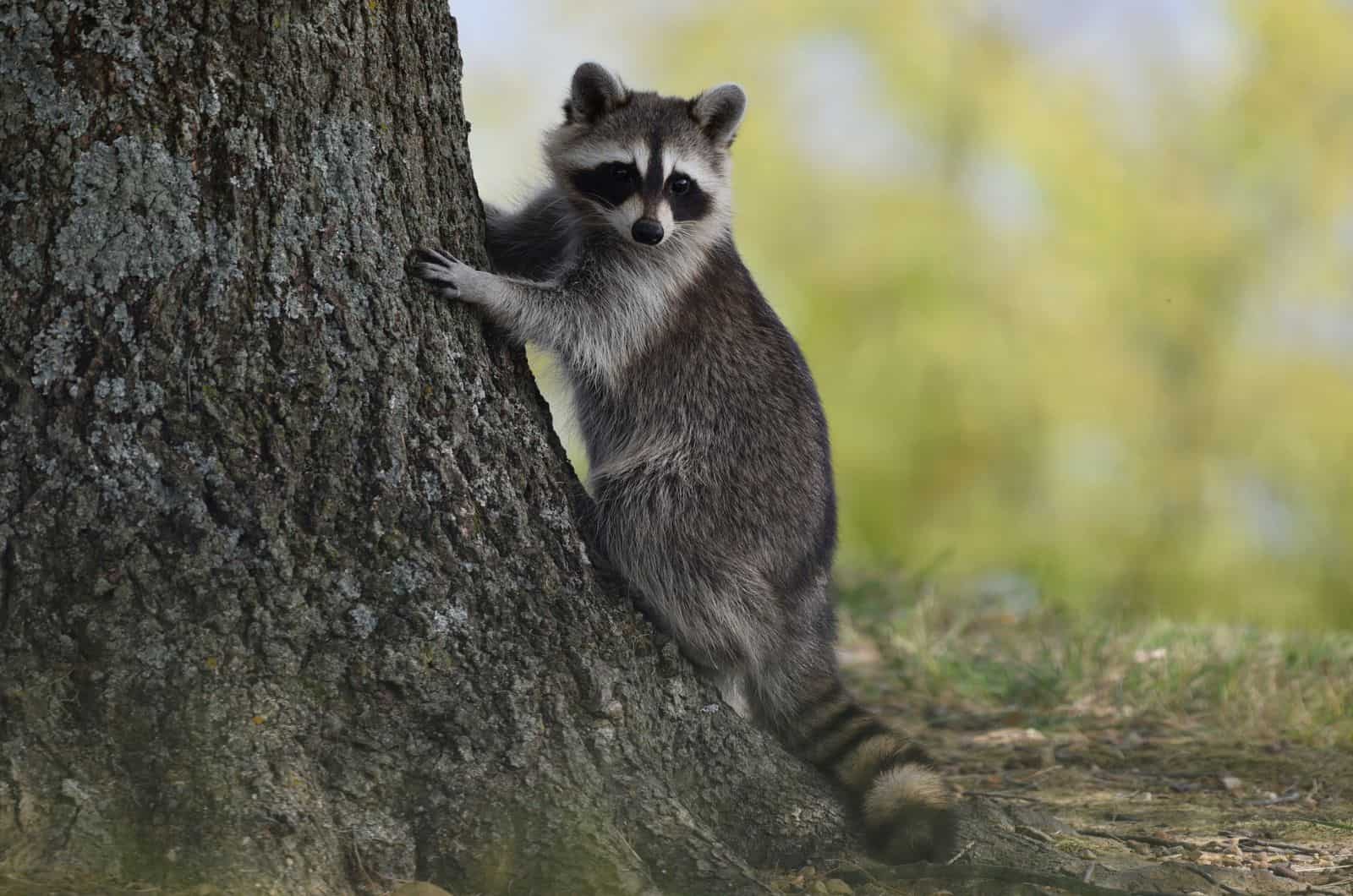
Sometimes it’s hard to be 100% sure that raccoons are wreaking havoc on your property because these animals are only active at night.
But there are some tell-tale signs you have these rascals on your property.
I mentioned that these animals adore trash cans, so raccoons are most likely the culprits if you keep finding trash all over your yard. They’ll also break trash cans and bird feeders.
Another sign of raccoons is small holes in the lawn that seem to occur overnight. Many other animals make small holes, so look for other signs to be sure.
You may also notice droppings all around your property. They’re typically about 3 inches long, cylinder-shaped, and dark.
There’s one thing I especially hate about these creatures; they make a loud noise at night. I am really scared of the sound of their claws on roofs.
If you notice some scars on your trees, naughty raccoons were likely scratching them the night before.
When To Contact Professionals
If you have tried all the methods above (except dealing with chimneys, mother raccoons, or installing live raccoon traps), and an infestation occurs, you need to hire professionals.
Raccoons are pretty aggressive animals, so it would be best to contact a professional pest management firm or animal control organization. You shouldn’t risk it as you could get wounded or sick by dealing with these animals on your own.
You shouldn’t touch the nest, especially with babies inside, as you could leave them without their mothers, which they won’t survive.
FAQs
Will a porch light keep raccoons away?
Unfortunately, porch lights won’t keep them away. Yes, these animals are scared of bright lights, but porch lights are way too high to repel them. If you decide to use lights as deterrents, you’ll need to find more suitable locations. Lights aren’t enough in most cases, so combining this method with some others we listed above is a better choice.
What time of night do raccoons usually come out?
These are nocturnal animals that normally spend the day sleeping and the night scavenging for food. They typically leave their dens shortly after dusk and immediately seek out the closest food source. Of course, they can come in any time at night if their recent quest for food fails.
What do raccoons eat?
They are omnivores, which means they eat practically everything. They will consume almost anything that even remotely resembles food in a residential area. Your trash cans or compost pile will be targeted.
Wrapping Up
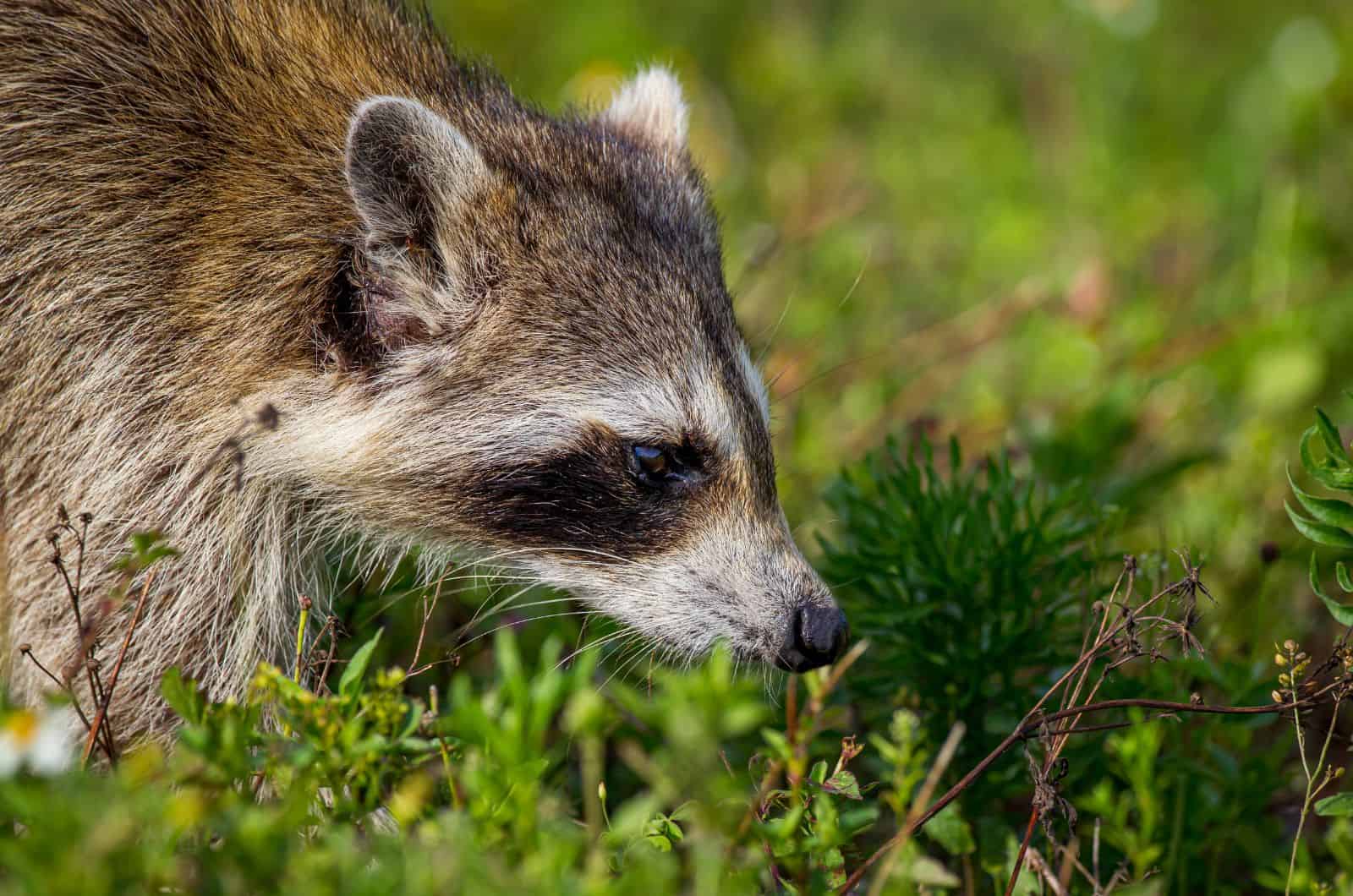
No one likes seeing their yards or gardens destroyed and full of trash.
The worst of all is that feeling that something is hiding in your attic, chimney, or even walls.
Unfortunately, a raccoon infestation is not-so-rare, which makes us even more scared. No wonder there are so many methods for how to deter raccoons. Many people are using everything they can just to keep these animals away from their properties.
I showed you methods that will keep raccoons at bay, and if none of them works, professionals are there to help!
Until next time!
Like this post? Share or pin it for later!
